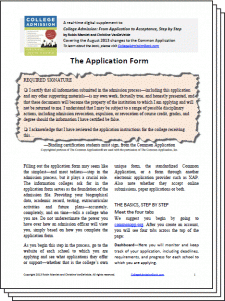While old friends can be a comfort at college, experts say students should make new connections.

The right school for one student may not be the right school for their best friend.
It's bound to happen sometime or another, either during the final talent show, or the senior prom, or while you're scribbling inside jokes into your last high school yearbook.
There comes a moment – full of joy or tinged with sorrow – where you look up at your closest high schoolbuddies and wonder, "Will we still be friends in five years?"
Making the transition from high school to college can be an exhilarating, and sometimes daunting, rite of passage. While some students decide to part ways with their pals in search of new experiences, others value the comfort of embarking on the journey with their closest friends.
Whether it's wise to factor high school friends into the college decision-making process depends on the kind of person you are, experts say.
Before students plan their escape across the country or vow to attend the same college as their BFF, experts suggest they do a bit of soul-searching to determine what they want most out of the college experience.
"It's really important for students to know that even though there are a lot of great schools out there, what is right for their friend might not be right for them," says Grace Chapin, assistant director of admissions at the University of Chicago.
"I'm always talking about this idea of 'fit.' Students should ask, 'Is this going to be a good community for me?' That is really important and it can sometimes get lost with students who are saying, 'My friend goes here.'"
Caroline Kim, a college freshman from California, had to face the fit-versus-friend dilemma as she decided where to head off to school.
She and her best friend daydreamed about attending the same university. When her friend chose Williams College, Kim, who was also accepted, had a decision to make: follow her friend's footsteps or go to the University of Pennsylvania, which was a bit out of her comfort zone, but a better outlet for her volunteer work.
"I chose Penn because I thought it would be the place where I could grow the most," she says. "I'm still trying to find my family here. I'm getting involved in activities. It's a process, but it's the process that I wanted."
Jennifer L. Tanner, a developmental psychologist and cofounder of the Society for the Study of Emerging Adulthood, believes that if students have any inkling that they want to go off to school alone, they should follow Kim's lead and take the risk. Students with strong high school friendships shouldn't worry, she says – if they want to, they will maintain the relationships that matter.
"Going away to college is the one opportunity to invest in yourself," says Tanner. "It is the one time in your life where you have the opportunity to go and think, 'Who do I want to become? What kinds of friends do I want to have?' College is as much about that as it is about preparing for your career – if not more."
Not all experts believe it's wise for students to head off to college without a social safety net, however.
"If you send a kid to college without connections, it's a high stress event," says Robert J. Hedaya, founder of the National Center for Whole Psychiatry, who has written about the teenage brain.
"You are taking them out of their social system, their family system, all of the familiar things that root them in life. Then you take them to a foreign environment and give them a heavy course load and new social relationships. Then sprinkle some drugs and alcohol and expect them to do well. It's very difficult."
Hunter Dobson, an 18-year-old freshman at the University of Texas—San Antonio, says he knows firsthand how comforting it can be to have a friend on campus.
Dobson, originally from Austin, said he made his college choice with no regard to what friends would be joining him. But when he learned one of his childhood friends was also going to UT—San Antonio, he was relieved.
"I'm really glad he's here," he says. "It's not that I have a problem taking to people, it just makes everything a lot easier. The first two weeks you don't really know anyone. And we have a lot in common, so we made the same friends."
Students who choose a school based on their social network are in good company, experts say.
Barb Kefalas, associate director of residence life for Ohio State University—Columbus, says it's fairly common for students to choose a school based on the friends attending.
That's neither a good thing nor a bad thing, she says
"I think there is merit in that, especially if this is your first time away from home or if you don't have much world experience. It can be beneficial as long as you go beyond that one person. It's really important to form other relationships with faculty and staff and other students – it will benefit you in the long run."



